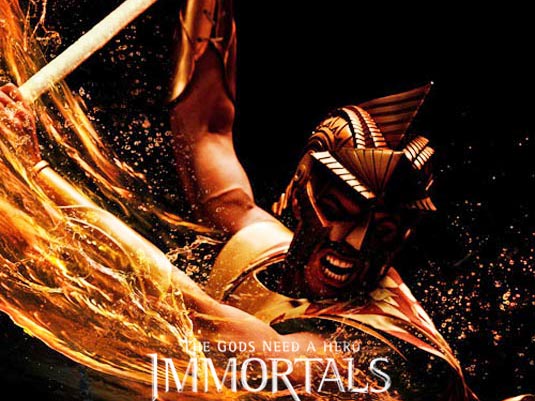
Sci fi blog i09 recently did an article: “The 10 Most God-Awful Movies about Greek Mythology.”
Sadly, I have to say Immortals belongs on the list. It’s definitely worse than #10 Percy Jackson & the Olympians, which I thought was good, harmless fun; and #1 Xanadu, which — c’mon now — never aspired to be more than cult-worthy camp.
I’d even give Clash of the Titans 2010 an edge over this year’s ancient Greek Hollywood tragedy. At least CofT had a lot of great action sequences.
Immortals is loosely, woefully loosely, based on the story of Theseus, the demi-god founder of Athens, who famously slayed the Cretan Minotaur. Nonsensical liberties with the source material was where the problems started for me.
Theseus is supposed to be the son of Poseidon, but in the movie he’s the son of Zeus. His mother was the daughter of royalty, and the wife to a nobleman. Immortals has his mother as an outcast peasant. It seemed to me a dumb contrivance to cast Theseus as an underdog the audience *has to* get behind, and already I was annoyed.
Then, the movie muddles the story of the gods vs. the titans. Here the gods — of whom there are curiously few — have defeated and banished the titans to imprisonment inside Mount Tartarus in a storyline that has more in common with Christian mythology (the exile of fallen angels) than anything ancient world-related. The titans can be freed by a lost artifact called the Epirus bow (derivation unknown). It’s a cool weapon, but what does it have to do with anything ancient Greek?
I won’t get bogged down in the other confusing details, because the greater transgression of the film is co-opting Greek mythology for a modern, Christian message. Like the Clash of the Titans reboot, Zeus is basically the Christian Holy Father done up in Greek fantasy stylings. It’s a story of good vs. evil, which has no place in the Greek belief system. The gods were mercurial, ruthless at times, forgiving at others, most definitely to be feared, but flawed by jealousy and pride. Their stories, their characters, were a reflection of human troubles.
When filmmakers portray that world with a Christian sensibility, they miss the point. The stories of Theseus and other heroes weren’t about smiting evil and restoring humanity’s belief in a higher power. They were about claiming glory in a ruthless world, and rarely were there happy endings. Even after their amazing triumphs – Perseus fulfilling his destiny by slaying the gorgon Medusa or Jason returning with the Golden Fleece — the heroes are typically dogged by tragedy. Perseus accidentally killed his grandfather, and went into a self-imposed exile. Jason returned from his adventures to be killed by his wife. The moral is that glory is fleeting. There are no absolutes. Good men come to bitter ends. The gods keep us all in line.
On the plus side, I felt that Henry Cavill does a decent job as a low-key, reluctant hero, and his fighting sequences were fun to watch. The costuming for the gods is delightfully over-the-top and sexy. Mickey Rourke is a suitable dreadful villain (Hyperion) but his gravelly muttering bothered me in this instance. Stephen Dorff is wasted as a disposable clichéd character – Theseus’ horny anti-establishment sidekick. And the United Nations of Oracles — a quartet led by Slumdog Millionaire’s Freida Pinto — are just plain ridiculous.
I think a little more 300-style homoeroticism could’ve compensated for a general lack of inspiration. But at least the men’s breastplates have nipples.

And also, the gods bleed ichor, which is golden blood. But near the end they bleed red blood. Gods are immortal, they cannot die. Titans are supposed to be huge. The god’s true form would parish and living creature who saw it, its to divine.
Hi Philip – Thanks for stopping by! I agree, there should have been consistency in the story, and while I’d give the filmmakers some license for re-imagining the mythological world, you can’t really get around that problem: how do immortal beings get killed so easily?
I agree.